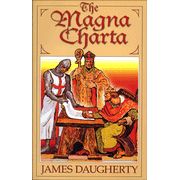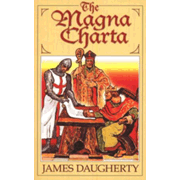Beautiful Feet books has reprinted this book which was originally printed in 1956. It focuses primarily on the English historical period surrounding the Magna Charta (1215). The history is retold in a lively, biographical fashion that makes for great read-aloud family time. We read about King Richard the Lionhearted and his crusading adventures that resulted in his premature demise. His death paved the way for the accession to the throne of his devious brother, King John, the signer of the Magna Charta and the primary focus of this saga. The last section of the book also discusses "charters" as a basis for democracy throughout modern history. Thus, it tells about the Mayflower Compact, The Declaration of Independence, The United Nations Charter, and a few other exemplary documents and events.
Daugherty's writing style is delightfully wry. An example: "The Indians did not have any charters to prove their rights and liberties, but the colonists very generously gave them a few red shirts and lots of very bad whiskey to sign papers saying that of their own free will they sold all their rights to the land to the white people forever. This, it was thought at the time, made everything right and legal for everyone" (p 133).
I found Daugherty's historical presentation refreshingly candid and relatively even-handed up to the point where he addresses present-day charters, treaties, and international alliances. If you read the first 130 pages of this book, you will have gotten more than your money's worth. At the end of the book, Daugherty presents an emotional appeal for a sort of "international democracy" as represented by the United Nations. Keeping in mind that he wrote shortly after the United Nations was conceived, and also shortly after the end of WWII, many will recognize the lack of historical perspective we've gained in the ensuing years. Also, Daugherty says, "The Constitution is a living charter that grows in wise, slow ways by the will of the people" (p 148). This is a statement with which many of us might disagree. You might read these final chapters, offering your own commentary or simply stop reading at page 130 before you get into his treatment of other "charters."










